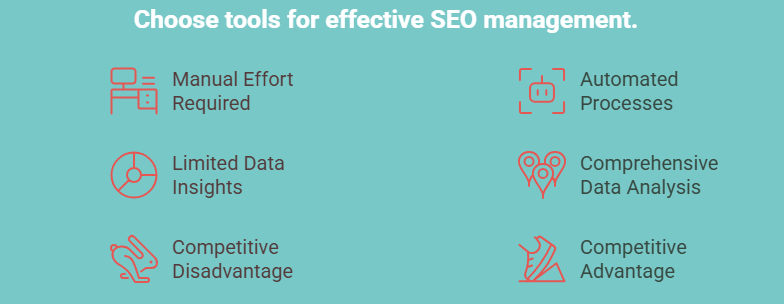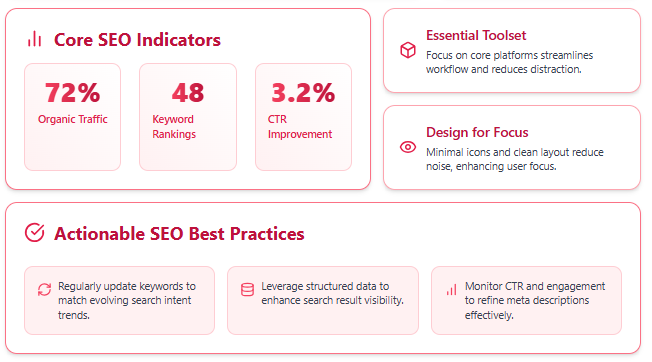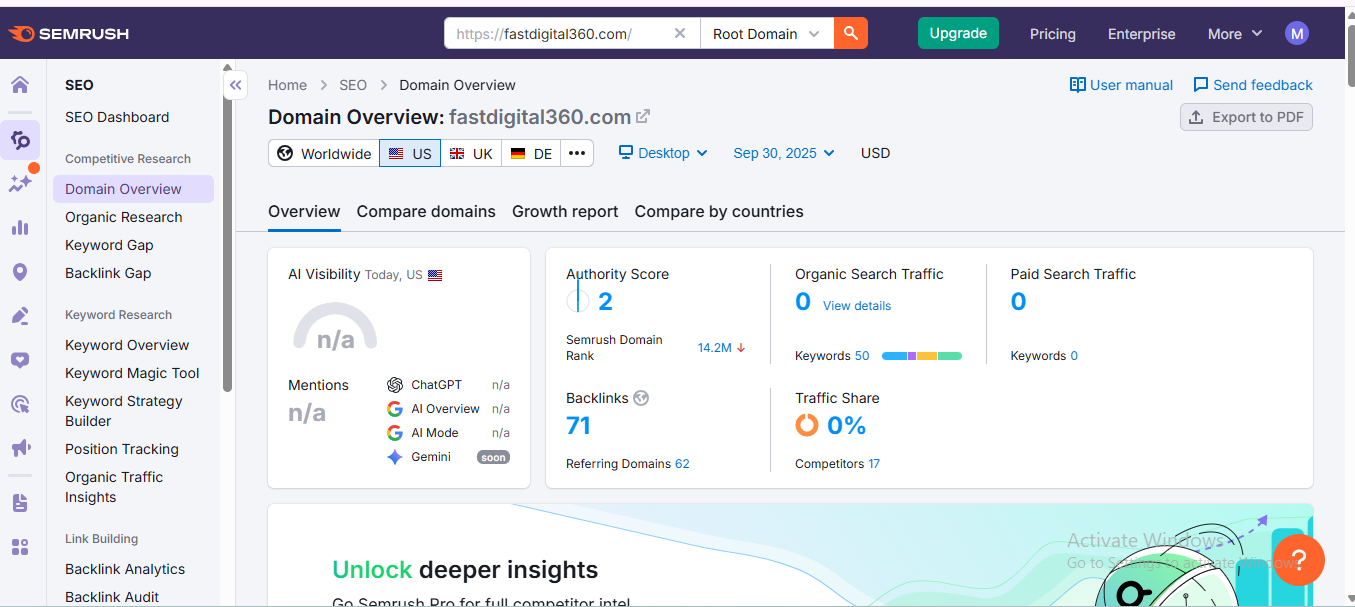Why SEO Tools Are Essential for Business Growth
In today’s digital world, competition is fierce. Every small business, e-commerce store, and global brand is fighting for attention on Google. But ranking high isn’t about guesswork—it’s about data, strategy, and consistent optimization. This is where SEO tools come in.
Instead of spending hours guessing which keywords to target, which links to build, or how to improve technical performance, businesses can use reliable SEO platforms to gather insights, track results, and outsmart competitors. Whether you are just starting your journey or running a well-established online business, SEO tools act like your digital toolkit, guiding every step of your strategy.
The Challenges of Doing SEO Without Tools
It’s like attempting to repair a car without the right tools in hand.That’s exactly what running a website without SEO tools feels like. Many businesses struggle with:
- Keyword Guessing: Choosing keywords without research leads to poor targeting and wasted effort.
- Lack of Tracking: Without tools, you don’t know what’s working and what isn’t.
- Time Wastage: Manual audits and checks are time-consuming and often inaccurate.
- Missed Opportunities: Competitors using advanced tools will always have the edge.
This is especially true for SEO for small local business, where owners often juggle multiple roles. Having the right tools allows them to identify local search terms, monitor competitors in their area, and optimize Google Business Profiles effectively.

Types of SEO Tools Every Business Should Know
There’s no “one-size-fits-all” SEO tool. Different aspects of search engine optimization require different features. Let’s break them down:
- Keyword Research Tools
- On-Page SEO Tools
- Analyze content, titles, headings, and keyword placement.
- Example: Yoast SEO (for WordPress), SurferSEO.
- Technical SEO Tools
- Check site speed, mobile responsiveness, and crawlability.
- Example: Screaming Frog, Google Search Console.
- Backlink Analysis Tools
- Track who links to your site and find link-building opportunities.
- Example: Moz, Ahrefs.
- Local SEO Tools
- Essential for SEO for small local business.
- Example: BrightLocal, Whitespark, Moz Local.
Free vs. Paid SEO Tools
| Category | Free SEO Tools | Paid SEO Tools |
|---|---|---|
| Keyword Research | Google Keyword Planner, Ubersuggest | SEMrush, Ahrefs, KWFinder |
| On-Page Optimization | Yoast SEO (basic), Rank Math | SurferSEO, Clearscope |
| Technical SEO | Google Search Console, PageSpeed Insights | Screaming Frog, Sitebulb |
| Backlink Analysis | SmallSEOTools, Moz Link Explorer (limited) | Ahrefs, Majestic, SEMrush |
| Local SEO | Google Business Profile | BrightLocal, Moz Local |
This table shows that while free tools are great for beginners, businesses aiming for long-term success usually benefit from investing in paid platforms.
Why Beginners Should Start Simple
Many people ask: What are the best SEO tools for beginners? The answer depends on goals, but one common mistake is trying to use too many at once. Beginners often sign up for 5–6 tools, get overwhelmed, and end up quitting.
That’s why it’s better to:
- Start with 1–2 simple free tools like Google Keyword Planner and Google Search Console.
- Gradually add more advanced ones as you grow.
- Focus on learning insights instead of chasing fancy dashboards.

💡 Pro Tip
If you’re new to SEO, don’t fall into the “shiny object” trap. Stick to a couple of tools, learn how to use them deeply, and scale up gradually. Mastery of one tool is far more valuable than surface knowledge of ten.
The Role of SEO Tools in Small Local Business Growth
For local businesses, SEO tools aren’t just optional—they’re critical for survival. A bakery in New York, a plumber in London, or a dentist in Sydney needs local customers, not global ones. Tools like BrightLocal or Moz Local ensure that local businesses appear in “near me” searches, get reviews optimized, and stay ahead of nearby competitors.
For instance:
- A small coffee shop can find keywords like “best coffee shop near me” instead of targeting generic terms like “coffee shop.”
- A dental clinic can use Google Search Console to track how people in their city find them online.
- By combining keyword research with local optimization, small businesses can achieve more visibility without overspending on ads.
Why Businesses Should Embrace SEO Tools Early
The earlier you integrate SEO tools into your business, the better. Early adoption helps you:
- Build a strong foundation for organic growth.
- Outperform competitors who are still relying on guesswork.
- In the end, you’ll conserve valuable time, reduce costs, and minimize unnecessary effort.
Remember, SEO isn’t about overnight success—it’s about consistency. And tools act as your compass, keeping you on track in the ever-changing digital landscape.
Best SEO Tools for Beginners & Small Businesses
When starting your SEO journey, it’s easy to feel overwhelmed by the sheer number of tools on the market. From keyword trackers to backlink analyzers, each claims to be the “best.” But beginners and small businesses don’t need to invest in everything at once. Instead, the key is to focus on the best SEO tools for beginners that offer simplicity, guidance, and measurable results without a steep learning curve.
Below, we’ll explore essential tools, how local businesses can leverage SEO, and why choosing the best keyword research tool can set you apart from competitors.

1. Best SEO Tools for Beginners
For new marketers, entrepreneurs, or small businesses, the right SEO tools make all the difference. They simplify the process, reduce guesswork, and help you learn by doing. Here are some of the most beginner-friendly SEO platforms:
| Tool | Key Benefit | Why It’s Beginner-Friendly |
|---|---|---|
| Google Search Console | Tracks performance, search queries, and indexing issues | Free, easy to set up, and directly from Google |
| Yoast SEO (WordPress Plugin) | On-page SEO optimization and readability analysis | Step-by-step suggestions for beginners |
| Ubersuggest | Keyword ideas, traffic analysis, and site audits | Affordable pricing and simple dashboard |
| AnswerThePublic | Visualizes questions and queries people search | Great for brainstorming blog and content topics |
| Moz Free Tools | Domain authority and link analysis | Clean interface, easy to navigate |
These tools help new users understand how SEO works while making optimization manageable. For example, Yoast SEO gives inst/nt feedback on whether your blog is optimized, while Google Search Console tells you exactly what search terms are bringing visitors to your site.
💡 Pro Tip
Don’t jump into 5 or 6 paid tools at once. Start with free tools like Google Search Console and Keyword Planner, learn the basics, and only upgrade when you’re confident about scaling.
2. SEO for Small Local Business
Small local businesses thrive when they leverage SEO for small local business, including optimized Google My Business listings, local keyword targeting, and reputation management. These strategies help you appear in local searches and reach customers right in your neighborhood. Learn more about our proven local-SEO-strategies
For small businesses, SEO isn’t just about ranking nationally or globally—it’s about visibility where it matters most: your local market. Whether you run a restaurant, salon, law firm, or repair service, SEO for small local business can significantly impact foot traffic, phone calls, and revenue.
Here’s how local SEO helps small businesses thrive:
a) Optimize Google Business Profile
Claim and verify your Google Business Profile (GBP). Add accurate details like your business name, address, phone number, opening hours, and website. Upload real images, respond to reviews, and regularly post updates. Google uses this information to decide whether your business deserves to appear in the “local 3-pack” (the top 3 results on Maps).
b) Use Localized Keywords
Instead of competing for broad search terms like “plumber” or “best dentist,” target location-based keywords like “affordable plumber in Karachi” or “best dentist near Lahore Cantt.” These keywords reduce competition and bring in customers searching specifically in your area.
c) Manage Reviews and Ratings
Positive reviews boost both credibility and rankings. Encourage satisfied clients to leave feedback, and always reply—even to negative reviews. Google considers responsiveness a ranking factor.
d) Local Citations
Consistency is crucial. Ensure your Name, Address, and Phone number (NAP) are identical across online directories such as Yelp, Bing Places, and Facebook Business Pages.

💡 Pro Tip
Use tools like BrightLocal or Whitespark to track your citations and monitor local rankings. These tools show exactly how your business appears across directories, making local SEO more manageable.
3. Best Keyword Research Tool
At the heart of every successful SEO campaign lies keyword research. Without understanding what your audience searches for, you risk targeting irrelevant or overly competitive terms. Choosing the best keyword research tool helps uncover search trends, buyer intent, and profitable content opportunities.
Here are some top keyword tools worth considering:
| Tool | Best Use Case | Strength |
|---|---|---|
| SEMrush | Comprehensive keyword + competitor analysis | Ideal for marketers scaling campaigns |
| Ahrefs | Backlink tracking and in-depth keyword insights | Best for competitor spying and content gaps |
| Google Keyword Planner | Ad and SEO keyword planning | Free, directly linked to Google Ads |
| KWFinder | Finding long-tail, low-competition keywords | Beginner-friendly with clear metrics |
| Serpstat | Keyword research and site audits | Affordable alternative to premium tools |
A beginner may start with Google Keyword Planner to find search terms. As they scale, tools like Ahrefs and SEMrush provide deeper competitor insights.
💡 Pro Tip
Instead of chasing short, competitive keywords like “SEO tools,” focus on long-tail keywords such as “best SEO tools for beginners in 2025” or “SEO for small local business growth.” Long-tail keywords have lower competition and higher intent, which often results in better conversions.
4. How to Choose the Right Tools
Not all SEO tools are created equal, and your choice depends on your business goals. Here’s a quick framework to help:
- Beginners → Start with free and beginner-friendly tools like Google Search Console, Yoast SEO, and Ubersuggest.
- Small Local Businesses → Add location-based tools like BrightLocal and ensure you’re optimizing Google Business Profile.
- Growing Businesses → Upgrade to SEMrush, Ahrefs, or Moz Pro for comprehensive keyword tracking, competitor analysis, and content strategy.

💡 Pro Tip
Don’t assume that expensive equals better. Sometimes a free tool, used correctly, can outperform a paid one if you’re targeting the right audience.
Advanced SEO Tools and Strategies for Sustainable Growth
By this stage, you’ve understood the best SEO tools for beginners, how local businesses can leverage SEO, and the importance of picking the best keyword research tool. But as your business grows, you need more advanced strategies and tools to scale effectively, cut wasted effort, and maximize returns.
Advanced SEO doesn’t mean complicated for the sake of it—it’s about using smarter approaches to create long-term impact.
1. Advanced SEO Tools Worth Considering
Once you’ve mastered the basics, scaling requires tools that go beyond keywords and rankings. Here are a few advanced SEO tools designed to support businesses at growth stage:
| Tool | Advanced Feature | Why It Matters |
|---|---|---|
| Screaming Frog SEO Spider | Site crawl for technical issues | Identifies broken links, duplicate content, and redirects |
| SurferSEO | Content optimization using AI | Helps align blogs with top-performing SERP pages |
| Majestic SEO | In-depth backlink analysis | Provides trust flow and citation flow metrics |
| BuzzSumo | Content performance insights | Reveals what topics get the most shares and links |
| Clearscope | Semantic keyword integration | Ensures content relevance with natural keyword use |
These platforms are particularly useful for business owners and marketers who want to build long-term authority, rather than just chase traffic.
2. Integrating SEO with Business Goals
One of the most common mistakes businesses make is treating SEO as a separate marketing activity. In reality, SEO must align with broader goals such as sales, customer retention, and brand awareness.
For example:
- If your goal is lead generation, your SEO strategy should focus on long-tail keywords with high buyer intent.
- If your goal is brand visibility, focus on top-of-funnel content like blogs, FAQs, and guides.
- If your goal is sales growth, integrate SEO with Google Ads campaigns for maximum visibility across paid and organic search.
3. SEO for Long-Term Growth
SEO is not a quick fix. It’s an investment in consistent visibility. While paid ads disappear when budgets stop, SEO continues to generate leads for months and even years. Here’s how advanced SEO ensures long-term growth:
- Content Depth: Instead of short blogs, create pillar content with comprehensive insights.
- Backlink Strategy: Earn links from authoritative sites through guest posting, digital PR, and collaborations.
- Technical SEO: Ensure fast site speed, mobile responsiveness, and proper indexing.
- Voice Search Optimization: As more users adopt smart devices, optimizing for voice queries (“near me” searches) becomes crucial.
4. The Human Side of SEO – Why Expertise Matters
Even with the best SEO tools, results depend on who is managing them. Business owners often try the DIY route but end up frustrated. That’s where an SEO professional or agency can make a difference.
A professional SEO manager not only uses tools but also interprets data, predicts trends, and develops creative campaigns tailored to your business goals. Tools provide the “what,” but specialists deliver the “how” and “why.”
5. DIY vs. Professional SEO Management
For business owners still debating whether to manage SEO themselves or hire help, here’s a quick breakdown:
| Approach | Pros | Cons |
|---|---|---|
| DIY SEO | Cost-effective, full control, learning opportunity | Time-consuming, slower results, higher risk of mistakes |
| Professional SEO Specialist/Agency | Expertise, faster results, advanced tools, strategy alignment | Higher upfront cost, reliance on external support |
For small local businesses, starting with DIY is fine. But as your competition grows, having a professional ensures your efforts don’t plateau.
6. Building an SEO Strategy That Lasts
SEO should never be about quick hacks. Instead, it should be built around sustainable practices:
- Content Calendar: Plan blogs, guides, and updates at least 3 months in advance.
- Keyword Diversification: Mix short-tail, long-tail, and local keywords for balanced growth.
- User Experience (UX): Optimize not only for search engines but also for human readers—fast, easy-to-navigate websites get better results.

- Continuous Learning: SEO evolves with algorithm updates. Busineses must stay flexible and adapt quickly.
When done right, SEO becomes more than just marketing—it becomes an engine for long-term growth and competitive advantage.
Conclusion
In today’s competitive digital landscape, using the right SEO tools isn’t optional—it’s essential. Whether you’re a beginner learning the basics, a small local business striving to stand out in your community, or an established company looking to scale with advanced strategies, the right tools can transform how you attract and convert customers.
But tools alone are not enough. Success comes from knowing how to apply them strategically, align them with your business goals, and continuously refine your approach. That’s where expert support makes all the difference.
At Fast Digital 360, we specialize in helping businesses harness the full potential of SEO, from keyword research and on-page optimization to technical audits and long-term growth strategies. Explore our full range of SEO and digital marketing services to see how we can guide your brand toward measurable success.
If you’re ready to maximize visibility, reduce wasted effort, and generate higher-quality leads, don’t wait. Reach out through our contact page and let’s start building an SEO strategy that works for your unique business needs.
With the right tools and the right expertise, your business can rise above the noise and achieve sustainable online growth.
Frequently Asked Questions (FAQ)
Q1. What are SEO tools?
SEO tools are software platforms that help businesses analyze, optimize, and track their website’s performance on search engines. They assist in keyword research, content optimization, backlink tracking, and overall growth.
Q2. What are the best SEO tools for beginners?
For beginners, tools like Google Search Console, Yoast SEO, Ubersuggest, and AnswerThePublic are ideal. They are user-friendly, affordable (or free), and provide clear guidance on improving website rankings.
Q3. How can SEO help a small local business?
SEO for small local business improves visibility in local search results, drives targeted foot traffic, and increases online inquiries. Tools like BrightLocal and Moz Local help manage citations, reviews, and local keyword optimization.
Q4. What is the best keyword research tool?
Some of the most reliable keyword research tools include Ahrefs, SEMrush, KWFinder, and Google Keyword Planner. They help identify high-traffic, low-competition keywords to attract the right audience.




